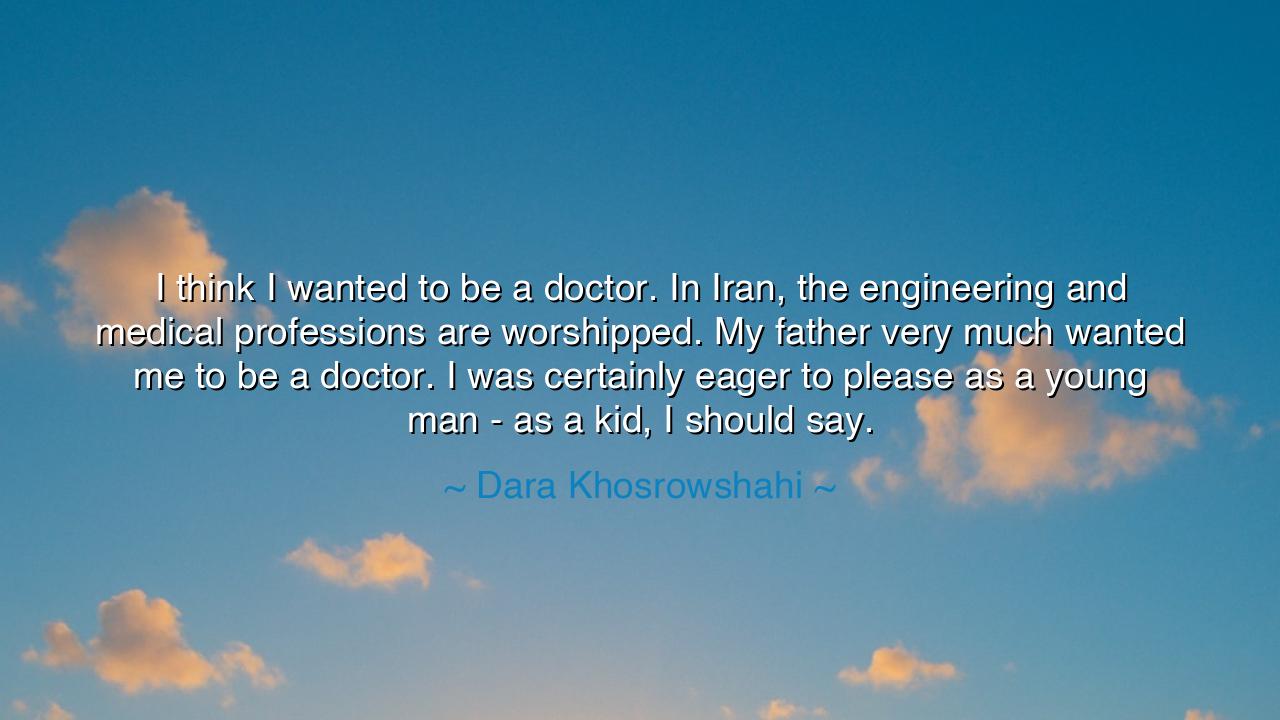
I think I wanted to be a doctor. In Iran, the engineering and
I think I wanted to be a doctor. In Iran, the engineering and medical professions are worshipped. My father very much wanted me to be a doctor. I was certainly eager to please as a young man - as a kid, I should say.






Hear the words of Dara Khosrowshahi, who reflects upon the roads of destiny and the weight of expectation: “I think I wanted to be a doctor. In Iran, the engineering and medical professions are worshipped. My father very much wanted me to be a doctor. I was certainly eager to please as a young man—as a kid, I should say.” In these words, spoken with humility, he reveals the power of family, culture, and youth’s desire for approval. He names the reverence with which medicine and engineering are held, and how the dreams of parents shape the hearts of children.
The origin of his statement lies in the soil of Iran, where for generations professions such as doctor and engineer were seen not only as careers, but as sacred callings. They embodied status, honor, and respect. To heal the sick or to build great structures was to lift one’s family and one’s community. In such a culture, a father’s wish for his son to pursue medicine was not merely personal—it was the passing down of an ideal, the hope of seeing his child crowned with honor. And Dara, like many sons, longed to please, to fulfill the desires of the one he revered.
The ancients, too, understood this tension. In Rome, sons of senators were expected to take up politics, while in Athens, sons of philosophers were drawn toward wisdom. Yet history shows that not all could or should walk the path prescribed. Some found their true calling elsewhere, and in doing so, served humanity in unexpected ways. So it was with Khosrowshahi: though he did not become a physician of the body, he became instead a builder of enterprises, guiding companies through trials, healing not with scalpels but with leadership.
Consider the story of Galileo Galilei. His father, Vincenzo, wished him to study medicine, for it was a respected and profitable profession. Young Galileo began upon that path, but his heart was drawn to mathematics and the study of the stars. Though he disappointed his father’s wish, he followed his true calling, and in doing so, reshaped the world’s understanding of the universe. Like Dara’s story, it is a reminder that though we often begin by striving to please, our greatest service may lie in the direction of our own authentic path.
The meaning of Khosrowshahi’s words lies in the universal struggle between expectation and identity. He reminds us that culture can “worship” professions, elevating them above others, and that parents, out of love and hope, may press their children toward such revered roles. Yet, within the heart of every child lies the quiet question: “What is truly mine to do?” To please others is noble, but to fulfill one’s own calling is essential. The balance between the two is the crucible in which many destinies are forged.
The lesson for us is this: honor the expectations of those who raised you, but do not be imprisoned by them. Recognize that your parents’ dreams come from love, but remember that their path is not always your own. If you can, carry the values they cherished—service, dedication, excellence—into whatever field you choose. To become a doctor is honorable; but so is becoming a leader, a teacher, an artist, or an innovator, if done with the same spirit of devotion.
Practical action flows from this wisdom: listen with respect to the hopes of your family, but search also within your own soul for the work that ignites you. Carry forward the virtues your parents admired—discipline, compassion, perseverance—even if your profession differs. And if you are a parent yourself, encourage your children not only toward status, but toward authenticity, that they may serve the world with joy as well as duty.
Thus Khosrowshahi’s words endure as both confession and teaching. They remind us that the longing to please others is part of our human story, yet the truest offering we can give is the life lived in harmony with our deepest calling. For in the end, whether one heals the sick, builds bridges, or guides nations, what matters most is that the work is done with integrity, courage, and devotion. This is the wisdom handed down, and this is the torch we must carry forward.






AAdministratorAdministrator
Welcome, honored guests. Please leave a comment, we will respond soon